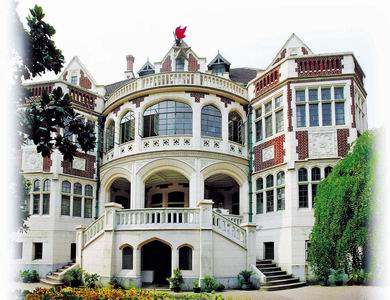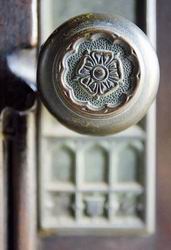Shanghai Daily news

The ChildrenĄ¯s Palace of Changning District on Yuyuan
Road was built by Wang Boqun, a Kuomintang official, for his
second wife.

One of many original door knobs.
Michelle Qiao opens the door on true love at a building which is now teaching
children Chinese treasures.
The Children's Palace of Changning District on
Yuyuan Road was nicknamed ``Wang Gong Guan'' (Wang's residence) after Japanese
occupation (1937-45). The so-called Premier Wang Jingwei lived in the Gothic
castle during that time -- it was one of many houses he used to escape his
enemies.
But it is the occupants before that time which are the most
intriguing. The residence was a love nest of a powerful Kuomintang official,
Wang Boqun. It was a gift for his second wife.
Driven by passion, Wang Boqun
was a perfectionist. The black antique ceiling fans are still functioning. The
5,000-square-meter garden is dotted with trees and flowers. The fireplaces, the
exquisite wooden decorations on the ceilings and the blue-and-white tiles were
all home to a short but true love more than 70 years ago.
Born in 1885 in
Guizhou Province, Wang Boqun studied in Japan and returned to China in 1911 to
join the Chinese revolution led by Dr Sun Yat-sen.
``Wang helped Sun
establish the Guangzhou government in 1921,'' says Xue Liyong, an expert from
the Shanghai History Museum. ``In 1913 Wang's brother Wang Wenhua was murdered
on Xizang Road by Yuan Shikai, who attempted to create a new imperial
dynasty.''
Wang Boqun was later appointed Traffic Minister and president of
both Jiao Tong University and Daxia University (now East China Normal
University).
He was one of the founders of Daxia University. ``He was a shy
man whose wife died early,'' says Xue. ``His sister married a Kuomintang
general. She arranged a blind date for Wang and Bao Zhining, who was considered
the most beautiful girl in Daxia University. Although the government had built
two houses for Wang in Nanjing (Jiangsu Province), Wang decided to build this
villa in Shanghai so he could marry Bao. It has 32 rooms. The marriage was
considered scandalous by many.''
It's believed Bao agreed to marry Wang after
he made three promises -- to give her a large sum of money, send her overseas to
study and build a grand house. They were married in 1931 when Bao was only 20
years old.
``A marble statue shaped like an angel used to stand in the
sitting room,'' says Xue. ``Wang loved Bao so much that he thought she was an
angel. So he bought this statue from Europe as a gift to please her. The angel
was concealed in a wall on the first floor during the cultural revolution
(1966-76).''
Their happy time in the luxurious villa did not last long. Wang
resigned from his position as minister in 1932 after he was suspected of
improper financial dealings with the architects.
When war broke out in 1937
the family had to escape to Chongqing. Wang died from a stomach disease in 1944,
leaving four small children and a pregnant Bao.
Bao tried to win back the
house in 1945 and leased the first and second floors to the news office of the
British consulate. She later moved her family to New York.
``I saw her in
1985 when she returned to visit the house,'' says Zhang Feijing, director of the
Children's Palace. ``She was still a very beautiful lady who had a tiny,
delicate face. She was similar to Soong Mei Ling (wife of late Kuomintang
President Chiang Kai-shek).''
Now named the Children's Palace, the house
welcomes thousands of children who can learn Chinese calligraphy, painting,
music, dancing and other skills after school. It's also open to foreign
children.
Zhang maintains contact with Bao's youngest daughter, 60-year-old
Wang Deling who visits to the house almost every year.
``Many people with a
connection to the house have visited, including Wang Boqun's old secretary,
former students of Daxia University and Wang's relatives,'' says Zhang. ``Wang's
children from his first marriage were all unhappy with the second marriage. They
thought Bao caused the early death of their father. Even former Daxia University
students considered the marriage indecent. They refused to mention Bao in a
chapter of a book biography of the university.''
Bao's children wanted their
mother to donate the house to the Shanghai government so a small museum could be
built. Bao had previously donated her houses in Nanjing. But she refused and
died in 2001.
``Bao told her daughter that the house was where she was
married and important to her,'' says Zhang. ``She did not re-marry and lived as
a widow for more than half a century. She raised Wang's five children.''
``It
takes a lot of money to preserve this house,'' says Zhang. ``Currently it
receives small-scale repairs every 10 years. The sewage pipes are rusted and the
walls are faded. Fortunately Wang used high-quality imported materials.''
The villa is a symbol of one woman's battle against the cruel gossip which
surrounded her marriage and is testimony to the grace with which she dealt with
all that confronted her.
The Children's Palace of Changning District
Address: No. 31, Lane 1136
Yuyuan Rd



